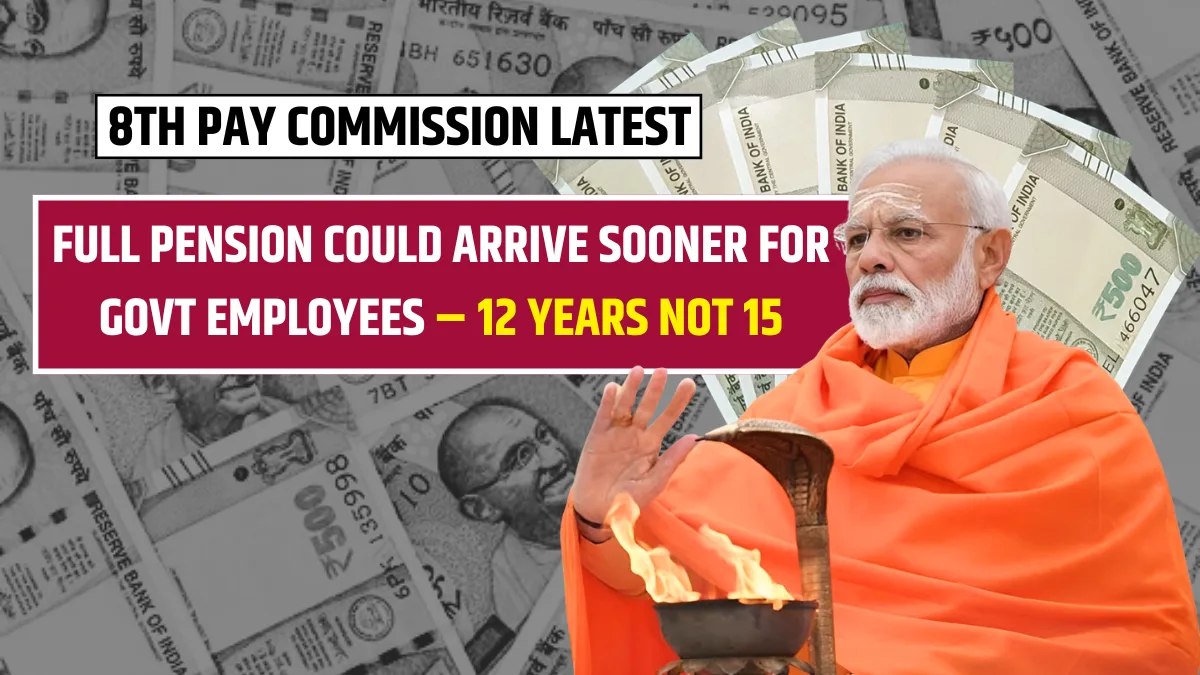8th Pay Commission Latest – The long-awaited changes to the pension structure for government employees in India are finally coming to light. After years of uncertainty, recent developments surrounding the 8th Pay Commission have sparked interest, especially in regard to the potential for full pension benefits arriving sooner. Traditionally, government employees were eligible for full pension only after completing 15 years of service. However, there is growing optimism that this period may soon be reduced to 12 years.
In this article, we’ll explore the latest updates, discuss how these changes might impact employees, and examine what these reforms could mean for future pensioners.

Understanding the Current Pension Structure
To appreciate the potential impact of the proposed changes, it’s essential to understand the existing pension system for government employees. Under the current framework, employees are entitled to receive full pension benefits only after serving for a minimum of 15 years. This structure, while ensuring substantial financial support for retirees, has often been a point of contention for many government workers, who have called for a reduction in the waiting period.
Pension serves as a critical part of the post-retirement financial security for government employees. It provides a steady income when they retire, allowing them to maintain their standard of living. However, the 15-year eligibility period has often been seen as a lengthy wait, particularly for those nearing the end of their careers and seeking to secure their financial future sooner rather than later.
The Case for Reducing the Eligibility Period
There has been increasing pressure from government employee associations to shorten the eligibility period for full pension benefits. Their argument revolves around the notion that 15 years is too long, especially considering the rising cost of living and the financial burdens that retirees face. Reducing this period would significantly ease the transition into retirement and provide employees with much-needed financial relief.
Many experts and employee representatives argue that reducing the waiting period to 12 years would not only make pension benefits more accessible but would also bring India’s pension system closer in line with global standards. Several countries already offer full pension benefits after shorter service periods, and adopting this model could help address many of the concerns faced by government workers in India.
The Latest Developments on the 8th Pay Commission
In the latest updates regarding the 8th Pay Commission, reports indicate that the government is seriously considering revising the pension eligibility criteria. Under the proposed changes, full pension could soon be available to employees after just 12 years of service, instead of the current 15 years. This change is part of a broader set of reforms that are being discussed under the 8th Pay Commission, aimed at improving the overall financial well-being of government employees.
This move is seen as an attempt by the government to address the growing concerns of its workforce and create a more sustainable and accessible pension system. By reducing the eligibility period, the government would not only provide a more financially secure retirement for its employees but also encourage longer tenures in service.
What This Means for Government Employees
If the proposed changes to the pension structure are implemented, government employees will have a clearer and more accessible path to full pension eligibility. This could dramatically improve the financial situation for many employees who may be nearing the 12-year mark in their careers, offering them the opportunity to secure their financial future without the additional 3-year wait required under the current system.
For those who have already served for 12 years, this change would be a welcome relief. No longer would they need to wait an extra three years to qualify for full pension benefits. This reduction in the qualification period would give retirees the opportunity to plan their finances with greater certainty and confidence, helping them enjoy their post-retirement life without the stress of financial insecurity.
Implications for Future Pensioners
The proposed reduction from 15 years to 12 years of service for full pension eligibility is expected to have lasting effects on future government employees. This change could set a new benchmark for pension reforms and incentivize younger employees to remain in government service for longer, knowing that they would become eligible for full pension benefits much sooner.
Additionally, the reduced pension qualification timeline could make government employment more attractive to potential recruits. Many young professionals, who may have previously overlooked a career in the public sector, could be drawn to government jobs as a result of these enhanced pension benefits. The move may even encourage greater retention among long-serving employees, further bolstering the overall strength of the workforce.
Will This Reform Have Any Impact on Other Benefits?
While the focus of the current discussions is on pension eligibility, there is speculation that the reform may have ripple effects on other benefits offered to government employees. A reduction in the pension qualification period could potentially prompt the government to reassess and improve other retirement-related benefits, such as gratuity, provident fund contributions, and post-retirement healthcare services.
Should the government expand its reforms to include these areas, it would significantly enhance the overall welfare of government employees, improving their financial well-being both during and after their careers. This could lead to a more comprehensive and supportive system for retirees, making government service even more attractive.
How Soon Could These Changes Take Effect?
While the idea of reducing the pension eligibility period has gained significant traction, it’s important to recognize that such a major policy shift takes time to implement. The government is likely to undertake a thorough review of the proposed changes before making any official announcements. Discussions with employee associations, experts, and other relevant stakeholders will likely continue for several months before the changes are finalized.
Nonetheless, given the widespread demand for reform and the urgency of addressing the financial concerns of government employees, the government is expected to prioritize these changes. It’s possible that the new pension eligibility period could be introduced within the next 1 to 2 years, depending on how swiftly the discussions progress.
Conclusion
The proposed reduction in the pension eligibility period from 15 years to 12 years represents a major step forward for the financial security of government employees in India. While the changes are still being discussed, they have generated a great deal of optimism among workers, who are hopeful for a more accessible and fair pension system.
If the reform is enacted, it will not only improve the quality of life for retirees but also set a new standard for government pension policies in India. For future pensioners, the change promises greater financial stability, allowing them to retire with the peace of mind that comes from knowing they will have access to full pension benefits sooner rather than later.
Ultimately, the 8th Pay Commission’s pension reform could have far-reaching implications for government employees, offering them greater financial security and contributing to a more sustainable and equitable pension system for all. It’s a move towards a more modern and efficient approach to managing the retirement needs of India’s public sector workforce.
Disclaimer: The information provided in this article is based on current reports and discussions regarding the 8th Pay Commission. It is subject to change, and official announcements should be referred to for confirmation.
